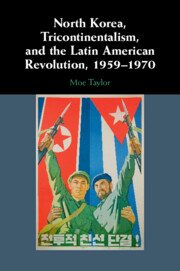Book contents
- North Korea, Tricontinentalism, and the Latin American Revolution, 1959–1970
- North Korea, Tricontinentalism, and the Latin American Revolution, 1959–1970
- Copyright page
- Dedication
- Contents
- Acknowledgements
- Abbreviations
- Introduction
- 1 North Korea and the Cuban Revolution, 1959–1965
- 2 Building the Anti-imperialist, Anti-US United Front, 1966–1970
- 3 Solidarity with the Latin American Revolution
- 4 North Korea as a Model of Development
- 5 North Korea as a Model of Development
- 6 North Korea as a Model of Revolution
- 7 The End of the Anti-imperialist, Anti-US United Front
- Conclusion
- Index
4 - North Korea as a Model of Development
Economic Policy
Published online by Cambridge University Press: 18 May 2023
- North Korea, Tricontinentalism, and the Latin American Revolution, 1959–1970
- North Korea, Tricontinentalism, and the Latin American Revolution, 1959–1970
- Copyright page
- Dedication
- Contents
- Acknowledgements
- Abbreviations
- Introduction
- 1 North Korea and the Cuban Revolution, 1959–1965
- 2 Building the Anti-imperialist, Anti-US United Front, 1966–1970
- 3 Solidarity with the Latin American Revolution
- 4 North Korea as a Model of Development
- 5 North Korea as a Model of Development
- 6 North Korea as a Model of Revolution
- 7 The End of the Anti-imperialist, Anti-US United Front
- Conclusion
- Index
Summary
In the search for a Cuban road to socialism, those advocating a gradualist and pragmatic approach clashed with Che Guevara and his supporters, who called for a radical and voluntarist development strategy. While criticized by Cuba’s Soviet and Eastern Bloc allies, Che’s radical economic ideas, which dominated Cuban policy by 1968, were shaped by North Korea’s example as well as its material support. North Korea appeared to show a tested path through which a small country emerging from colonialism and underdevelopment could transform rapidly into a modern, industrialized, socialist republic. The Cuban–North Korean ideological encounter reflected a broader discourse taking place within the international Left at the time reflecting disillusionment with the Soviet Union and the appeal of alternative models of socialism from the global South. As an ideological consensus between Cuba and North Korea solidified in the 1960s, the two governments became principal defenders of voluntarist economics within the socialist world, in resistance to the dominant trend towards “market socialism.” This partnership was given its most vibrant expression in the 1970 sugar harvest, Cuba’s pivotal experiment in voluntarist economics, in which North Korea participated directly.
Keywords
- Type
- Chapter
- Information
- Publisher: Cambridge University PressPrint publication year: 2023

